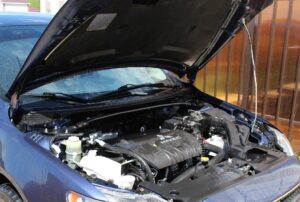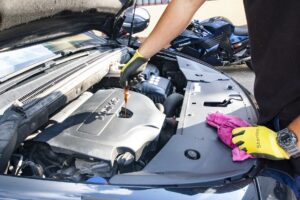What causes a car to overheat? If your car is overheating, you’re not alone. It’s one of the most common problems that drivers face. There are a number of things that can cause a car to overheat, from a broken fan belt to a leak in the radiator. In this blog post, we will discuss what causes a car to overheat and what you can do to prevent it from happening. We’ll also cover some tips for what to do if your car does start overheating.
what causes a car to overheat?
There are a few different things that can cause a car to overheat. One common cause is a low coolant level. If the coolant level gets too low, it won’t be able to do its job properly and the engine will start to overheat. Another common cause of overheating is a cooling fan that isn’t working correctly. The cooling fan helps to circulate air over the radiator and keep the engine cool. If it isn’t working properly, the engine can start to overheat.
Additionally, a blocked radiator can also cause the engine to overheat. If the radiator is blocked, the coolant can’t circulate properly and the engine will start to overheat. These are just a few of the most common causes of an overheating engine. If your car starts to overheat, it’s important to diagnose the problem and get it fixed as soon as possible.
What are the symptoms of a car overheating?
When it comes to what causes a car to overheat, there are a few different things that can cause your car to overheat. If the coolant level is low, it won’t be able to do its job properly and your car will start to overheat. A leak in the cooling system can also cause the coolant level to drop and lead to overheating.
Another common issue is a faulty thermostat. The thermostat controls the flow of coolant through the engine, and if it’s not working properly, it can cause the engine to get too hot. Finally, if the fan that pushes air through the radiator isn’t working correctly, it won’t be able to keep the engine cool.
There are a few symptoms of a car overheating that you should be aware of. The first is steam coming from under the hood. This is a sure sign that your car is overheating and you should pull over as soon as possible. Another symptom is the temperature gauge on the dashboard rising into the red zone. If you see this, you should also pull over and turn off the engine as soon as possible. Finally, you may also notice that your car is running rough or that the check engine light comes on.
How can I prevent my car from overheating?

There are a few different things that can cause a car to overheat. The most common is a problem with the cooling system. Coolant helps to keep the engine temperature regulated, and if there isn’t enough coolant in the system, the engine can overheat. Another potential problem is a broken water pump. The water pump circulates coolant through the engine, and if it isn’t working properly, the engine can overheat.
Another possibility is a blockage in the cooling system. This can be caused by a build-up of sediment or debris, or a leak in the system. Finally, a car can overheat if the cooling fans aren’t working properly. These fans help to circulate air through the radiator, and if they’re not working, the engine can overheat. If your car starts to overheat, it’s important to pull over and turn off the engine as soon as possible.
Once the engine is cool, you can check the coolant level and look for any leaks in the system. You should also check the operation of the cooling fans and water pump.
What should I do if my car starts to overheat?
Overheating is a common problem in automobiles, and it can have a variety of causes. In most cases, it is due to a lack of coolant or a blockage in the cooling system. If you notice that your car’s temperature gauge is climbing into the red zone, it’s important to take action immediately. First, turn off the air conditioner and roll down the windows to help dissipate heat.
Next, turn on the engine’s heater to full blast; this may seem counterintuitive, but it will help to remove heat from the engine. Finally, pull over and turn off the engine as soon as possible. Once the engine has cooled, open the hood and check the level of coolant in the reservoir. If it’s low, add more coolant until it reaches the full line. If the reservoir is empty, add water until it reaches the full line; then take your car to a mechanic as soon as possible for further diagnosis and repairs.
Should I add coolant to my radiator if it’s low?
A car overheats when the engine gets too hot. The coolant helps to keep the engine at a safe temperature by drawing away heat. If the coolant level is low, it won’t be able to do its job as effectively and the engine could overheat. In some cases, adding more coolant may be enough to solve the problem.
However, if the radiator is leaking or there is a blockage in the cooling system, simply adding more coolant will only be a temporary fix. It’s important to have a mechanic check the car to diagnose the problem and make any necessary repairs. Otherwise, you could find yourself stranded on the side of the road with an overheated engine.
How often should I check my radiator fluid level?

Overheating is one of the most common mechanical problems faced by car owners. The radiator is a critical component of the cooling system, and it is responsible for keeping the engine from overheating. Radiator fluid helps to transfer heat away from the engine, and it also prevents rust and corrosion. Although most radiator fluid will last for several years, it is important to check the level periodically.
A sudden drop in fluid level can be a sign of a leak, and it can lead to serious engine damage if left unchecked. For best results, check the radiator fluid level at least once a month, or more often if you notice any signs of cooling system problems. By taking this simple step, you can help to prevent serious engine damage and keep your car running smoothly.
What is the difference between coolant and water?
Most people think that coolant and water are interchangeable, but there are actually quite a few differences between the two. For one, coolant is often mixed with anti-freeze, which helps to prevent it from freezing in cold weather. In addition, coolant typically has a higher boiling point than water, which helps to prevent it from overheating in hot weather.
Coolant also usually contains rust inhibitors and other chemicals that help to protect your engine from corrosion. As a result, coolant is generally a better choice than water for use in your car’s engine. However, water can be used in a pinch, and it will still do a good job of keeping your engine cool. Just be sure to check your owner’s manual to see what type of fluid is best for your car. Thanks for reading!
Read more;
